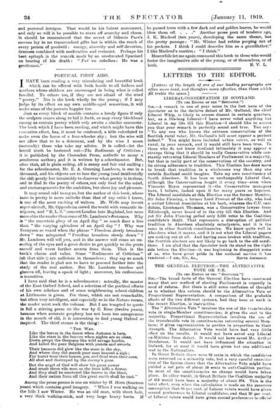POETICAL FIRST AIDS.
IHAVE been reading a very stimulating and beautiful book which can be offered with both hands to all fathers and mothers whose children are encouraged in being what is called fanciful. To others too, if they are not afraid of the word "poetry." Nor is the book wholly for the young ; if I may judge by its effect on my own middle-aged sensorium, it will make some of the parents happier too.
Just as every block of marble contains a lovely figure If only the sculptor comes along to bid it forth, so may every blockhead among us contain poetry which only awaits a similar summons. The book which I have been reading, and which might have this evocative effect, has, it must be confessed, a title calculated to make even the horse of a four-wheeler shy ; but the wise will not allow that to be a deterrent, and by the wise I mean (naturally) those who take my advice. It is called—let the horrid truth be hastened out—The Rudiments of Criticism ; it is published by the Clarendon Press, midwife to many a ponderous author; .and it is written by a schoolmaster. But, after that, all is plain sailing, all is smmy and fair and smiling; for the schoolmaster, Mr. E. A. Greening Lamborn, is one in a thousand, and his objects are to lure the young (and incidentally the old) gently but irresistibly to discover what poetry is in them, and to find in the poetry of othere,not only food for the mind, and encouragements for the ambition, but sheer joy and pleasure.
It may sound odd to say so, but the author of this book, whose taste in poetry is more catholic than that of any critic I know, Is one of the meet exciting of writers. Mr. Wells may invent super-aircraft, Mr. Oppenheim crowd the world with romantic in- triguers, and "it. L. S." convert London into Baghdad, but none more stirs the reader than some of Mr. Lamborn's ntenoes. Why is "the uncertain glory of an April day" so much finer a line than "the varying splendour of an April day " ? Why was Tennyson so vexed when the phrase "Freedom slowly broadens down" was misquoted "Freedom broadens slowly down " 1 Mr. Lamborn will tell you, and in the answer will some an un- sealing of the eyes and a great desire to get quickly to the poets oneself and wrest further secrete from them. That is the book's charm and value. Some "Rudiments of Criticism" (oh that title I) are sufficient in themselves; they say so much that the reader is glad not to have to proceed farther into the daily of the real author. But Mr. Lamborn touches and glances off, leaving a spark of light ; moreover, hie enthusiasm is transitive.
I have said that he is a schoolmaster actually, the master of the East Oxford School, and a selection of the poetical efforts
• of his OWR scholars and of some neighbouring school-children at Littlemore is given. For these, which are not remarkable, but often very intelligent, and especially so in the Nature verses, the reader must seek the volume. But I am tempted to quote in full a stirring poem on the war by C. Rose (twelve years), because when accurate prophecy has not been too conspicuous in the mouth of eld, it is interesting to find young Oxford so inspired. The third stanza is the thing!— " Tim WAR.
Like the leaves in the forest when Autumn is here, Like the stare in the heaven when nights are so clear, • Down swept the Germans like wild savage hordes, And killed the poor Belgians with pistols and swords. Their banners did glow like the stars ha the sky, And where they did march poor men heaved a sigh ; For burnt were their homes, yes, and dead were their eons, All shot and destroyed by the enemy's guns. But the angel of God will show his great power And or:rah these vile men as the frost kills a flower. And they shall be scattered like leaves in the blast, And their nation from off this great earth shall be cast."
Among the prose poems is one on winter by Ff. Horn (fourteen years) which contains good imagery. "When I was walking on the hills I saw Winter. He was an old man, with short hair, a very thick walking-stick. and very large heavy boots. If
he passed trees with a few dark red and golden leaves, he would blow them off. . . ." Another prose poet of tenderer age, J. K. Macleod (ten years), developing the same theme, has the pretty passage: "Mr. Winter had robins peeping out of his pockets. I think I could describe him as a grandfather." I like Maoleod's caution "I think."
Meanwhile let me again commend this book to those who would foster the imaginative side of the young, or of themselves, or of


































 Previous page
Previous page